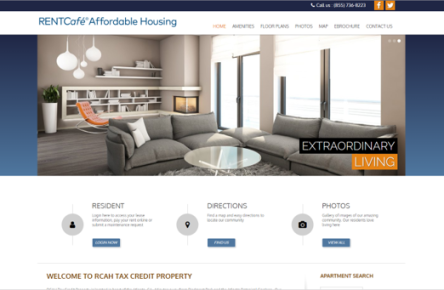Use of Yardi’s RentCafe Affordable Housing platform is skyrocketing. With more than 250,000 units covered nationwide, affordable housing providers, residents and applicants are reaping the benefits of online applications. Historically, affordable housing applications could be characterized as a big homework assignment. Interested households would leave a leasing office with an envelope full of papers to fill out and a checklist of things to find. Later, they’d be tracking down a photocopier for their bank statements, paycheck stubs and other paperwork. RentCafe Affordable Housing replaces that process with a self-service, online app. Applicants can work on their application when they want, and where they want. Instead of a stack of papers, applicants submit PDF’s and digital files. Files are safely stored electronically, not stuffed into a file cabinet. Rather than calling the affordable housing office, applicants can go to online FAQ’s and explainer videos to get their questions answered. Simply put: online applications are a big change and they’re creating a lot of benefits. Just how successful is RentCafe Affordable Housing in revolutionizing the process? Let’s look at the most up to date usage data from actual RentCafe Affordable Housing clients. By the numbers 683: the number of affordable housing applications created online every day, as of April 1, 2019. That’s 683 stacks of paper that don’t exist. That’s 683 (at least) applicant intake meetings that didn’t happen. That’s a lot of savings, and it’s happening 683 times every day. 78 percent: the rate of affordable housing applications that are abandoned before submission. This is a scenario where a high rate of abandonment is a good thing. By putting eligibility requirements and application forms online, applicants can self-screen themselves from the process. This statistic proves that nearly 8 in 10 do. Self-screening is a unique...
Easier Leasing
Affordable housing applications
Pinnacle Property Management Services (Pinnacle) manages a vast portfolio of residential, commercial and mixed use properties. Many of these are affordable housing units, developed under the Low Income Housing Tax Credit program. The many types of residential properties under management, including senior, student, affordable, luxury, market rate, etc., can present a challenge for leasing agents who must be well-versed in each vertical of the rental property industry. Affordable housing can be particularly challenging given the complexity of requirements necessary to comply with program requirements. Of course, the most basic of those requirements is that residents must qualify based on criteria such as income and assets. Documenting resident eligibility is the most important piece of a successful affordable housing program. Moving from paper-based applicant and resident files to electronic records is one of the ways the affordable housing industry is evolving to work more efficiently. Pinnacle is part of that evolution as it implements RENTCafé Affordable Housing. With RENTCafé Affordable Housing, Pinnacle saves time for leasing agents and ensures compliance with Low Income Housing Tax Credit program requirements. Those benefits result directly from changing to online housing applications and certification processes. “RentCafe Affordable Housing is such an amazing system when it’s used properly. If you haven’t used it, you’ll be surprised at how much time you can save and efficiency you can gain with it,” says Nick Strzelec. One of the biggest challenges of reviewing affordable housing applications is missing information. Using traditional paper forms, applicants can skip over questions they don’t have immediate answers to and forget to go back and fill in the missing data. Reviewers are stuck with an incomplete application and must reach out to the applicant to correct the omission. RENTCafé eliminates incomplete applications, which saves time for Pinnacle staff. “RENTCafé...
Cutting Costs
Online Affordable Housing Apps
Submitting an application for affordable housing is a daunting challenge. Tax returns, paycheck stubs and bank statements are just the beginning of what applicants must provide to qualify for a unit. Proof of eligibility for housing assistance is a must since public funds often support rents below market rate. Federal, state and local housing agencies have policies and procedures in place that ensure affordable housing resources only serve qualified residents. In the past, affordable housing providers kept files with thick stacks of paper as proof of each resident’s eligibility status. Providers also keep similar files for denied applicants to document why a household was determined ineligible for housing assistance. Affordable housing providers are taking a modern approach to minimize paperwork and staff hours necessary to qualify residents. With online applications, providers are not saving administrative costs, but also better documenting their resident files and boosting compliance with fair housing regulations. Rather than handing applicants a stack of forms to fill out, housing specialists can now direct applicants to an online portal to submit everything needed to qualify for a unit. RentCafe Affordable Housing from Yardi makes this possible, and it’s becoming more and more common throughout the industry. Just how big is the RentCafe Affordable Housing trend? More than 100,000 housing applications have been created online since the product launched in 2016. That’s more than 6,000 per month, and the numbers are growing every day. “Affordable housing applications have evolved from cumbersome, paper-based hassles into easy, online workflows. Applicants can submit documentation from their home computer or mobile device. That freedom saves applicants from taking time off work to come into the office for a lengthy in-person interview,” said Dave Kessler, vice president of affordable housing and PHA at Yardi. “If you consider it...



